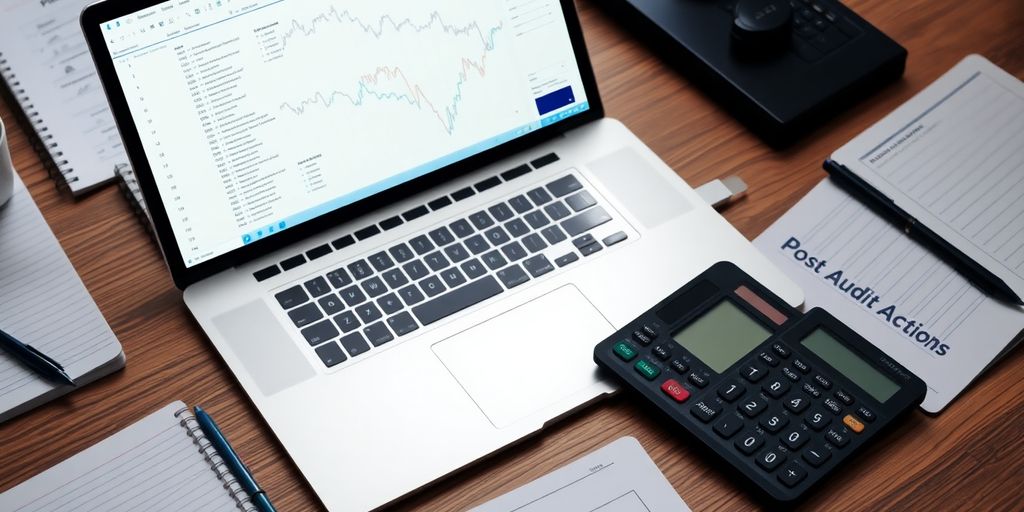[ newsletter ]
Stay ahead of Web3 threats—subscribe to our newsletter for the latest in blockchain security insights and updates.
Thank you! Your submission has been received!
Oops! Something went wrong. Please try again.
Master crypto audit preparation with essential steps for compliance and documentation organization.





Preparing for a crypto audit can feel overwhelming, but taking the right steps can make the process smoother. Whether you're a small startup or a larger organization, knowing what to do ahead of time is key. This guide outlines the essential steps you need to take for effective crypto audit preparation, ensuring you're ready when the auditor comes knocking.
Okay, so you're gearing up for a crypto audit? First things first, you gotta wrap your head around the rules of the game. It's not exactly a walk in the park, but it's super important. Knowing what's expected of you is half the battle.
Seriously, don't skip this step. What's legal in one state (or country) might be a big no-no somewhere else. You need to dig into the specific laws that apply to your business and where you operate. This could mean state laws about money services businesses, federal regulations, or even international guidelines if you're dealing with customers overseas. It's a bit of a headache, but ignoring it could land you in hot water. Think of it like this: you wouldn't drive a car without knowing the traffic laws, right? Same deal here.
Alright, you know the laws. Now, what do they actually mean for your day-to-day operations? What do you have to do to stay on the right side of the line? This is where you figure out your compliance requirements. Are you required to implement KYC (Know Your Customer) procedures? Do you need to keep detailed records of every transaction? Are there specific reporting requirements you need to meet? Make a list, check it twice, and make sure you're covering all your bases. It's better to be over-prepared than to get caught off guard.
Here's the kicker: the regulatory landscape for crypto is constantly changing. What's true today might not be true tomorrow. So, you can't just learn the rules once and call it a day. You need to stay on top of any new developments, amendments, or interpretations of the existing laws. Subscribe to industry newsletters, follow regulatory agencies on social media, and maybe even consider hiring a legal consultant who specializes in crypto. It's an ongoing process, but it's essential for staying compliant and avoiding surprises.
It's easy to get overwhelmed by the sheer amount of information out there. Start with the basics, focus on the regulations that are most relevant to your business, and gradually expand your knowledge base. Don't be afraid to ask for help when you need it. There are plenty of resources available to guide you through the process.

Okay, so you're gearing up for a crypto audit. You've got to get your documents in order. It's like cleaning your room before your parents come over, but way more important. A disorganized mess of files will not only stress you out but also make the auditor's job harder, which can lead to delays and potentially raise red flags. Think of it as presenting a clear and concise story of your crypto operations.
First things first, where are you keeping all this stuff? Random folders on your desktop? A dusty old hard drive? Not good enough. You need a secure, centralized location for all your documentation. Consider these options:
It's not just about security, though. Think about accessibility. Can your team easily access the documents they need, when they need them? A well-organized system balances security with usability.
Now that you have a secure place to store your documents, it's time to get organized. This means creating a clear and consistent labeling system. Here's a simple approach:
Documentation isn't a one-time thing. It's a living, breathing process. Policies change, transactions happen, and regulations evolve. You need to make sure your documentation stays up-to-date. Here's how:
Before you even think about bringing in an external auditor, it's super important to do a thorough internal audit. Think of it as a practice run. It helps you find any weak spots and fix them before the real deal. Plus, it shows the external auditors that you're serious about compliance.
Okay, so first things first: dig into those financial records. I mean really dig. Check every transaction, every ledger, every single thing. Make sure everything adds up and that there are no weird discrepancies. This is where you'll catch any errors or potential fraud. It's tedious, I know, but it's gotta be done. You need to ensure the accuracy of documentation.
Next up, make sure you're actually following your own rules. Do your policies and procedures match what you're actually doing? Are you following all the regulations? This is where you check that your actions align with your documented processes. If not, now's the time to fix it. It's better to find these things yourself than have an auditor point them out. This is a great way to learn about the strengths and weaknesses of your systems. Compliance is key in the crypto world.
Alright, so you've checked your records and your policies. Now, what can you do better? Are there any processes that are clunky or inefficient? Any areas where you're not quite meeting the mark? This is your chance to shine. Find those areas and come up with a plan to improve them. It shows initiative and that you're committed to doing things right. Consider whether there are areas that could be improved. For instance, there may be new technology available to strengthen your transaction screening process.
Doing an internal audit isn't just about finding problems. It's about showing that you're proactive and committed to doing things the right way. It's about building trust with your stakeholders and demonstrating that you take compliance seriously. It's a chance to learn and grow, and to make your organization stronger and more resilient.
Okay, so you're ready to pick an auditor. This isn't like picking a restaurant; you can't just go by the pictures. You need someone who knows their stuff, especially when dealing with crypto. It's a specialized field, and you want to make sure they're up to the task. A good auditor can really help streamline your audit process and make sure everything is above board.
First things first, do your homework. Don't just grab the first name you see. Look into their background. Have they worked with crypto companies before? What kind of certifications do they have? Experience matters, especially in the ever-changing world of crypto. You want someone who's seen it all and knows how to handle it. Make sure they are continuously updating their knowledge of cryptocurrency technology and regulations.
References are gold. Talk to other companies in the crypto space and see who they've used and what their experience was like. Online reviews can be helpful, but personal recommendations are even better. Did the auditor deliver on time? Were they thorough? Did they explain things in a way that made sense? These are all important questions to ask. It's like getting a referral for a good mechanic – you trust someone who's been vouched for.
Before you sign anything, sit down with the auditor and hash out the details. What exactly will the audit cover? How long will it take? What kind of report will you get at the end? Clear communication is key here. You don't want any surprises down the road. Make sure you're both on the same page about what's expected. This is your chance to make sure the auditor understands your specific needs and concerns.
It's important to remember that a good auditor isn't just there to find problems. They're also there to help you improve your processes and stay compliant. Think of them as a partner, not just someone who's checking your work.
It's almost showtime! You've done the prep work, now it's time to get your team in fighting shape. A well-prepared team makes the audit process smoother and more efficient. Think of it as prepping for a big game – everyone needs to know their role and be ready to execute.
First things first, make sure everyone understands why you're doing this. Don't just say "it's an audit." Explain the goals. Is it for compliance? To improve security? To attract investors? Transparency is key. When people understand the purpose, they're more likely to cooperate and take it seriously. Lay out the scope of the audit, what areas will be covered, and what the expected outcomes are. This helps to manage expectations and reduce anxiety.
Who's doing what? Don't leave it to chance. Assign specific roles to team members. Who's in charge of gathering financial records? Who's handling the official audit process? Who's the point of contact for the auditors? Make it clear who's responsible for what. A well-defined structure prevents confusion and ensures that tasks are completed efficiently. Create a simple chart outlining roles and responsibilities:
Don't assume everyone knows what to do. Provide training on the audit process, what to expect, and how to respond to auditor inquiries. This is especially important if your team hasn't been through an audit before. Cover topics like:
Preparing your team isn't just about ticking boxes; it's about creating a culture of compliance and continuous improvement. It's about making sure everyone understands their role in safeguarding the organization's assets and reputation.
Okay, so you've gone through the audit process. Now what? Don't just file away the report and forget about it. The real value comes from what you do with the findings. Think of the audit as a roadmap for improvement. It points out where you're doing well and, more importantly, where you need to make changes. Let's talk about how to actually use the audit to make your crypto operations better.
The audit report is more than just a grade; it's a guide. Dig into the details. What specific areas were flagged? What recommendations were made? Don't just look at the surface level; try to understand the why behind the findings. Was it a lack of training? A poorly designed process? Inadequate technology? Once you understand the root causes, you can start to develop targeted solutions. It's also a good idea to prioritize the findings based on their potential impact and the ease of implementation. Some changes will be quick wins, while others will require more time and resources.
This is where the rubber meets the road. It's not enough to just know what needs to be fixed; you have to actually do it. Create a detailed action plan with specific steps, timelines, and responsible parties. Don't try to do everything at once. Focus on the most critical areas first and then gradually work your way down the list. Make sure to track your progress and adjust your plan as needed. It's also important to communicate the changes to your team and provide them with the necessary training and support. Remember, change can be difficult, so be patient and persistent.
An audit's impact extends beyond the immediate team. It's important to keep stakeholders informed and involved in the process. This includes investors, partners, and even customers. Share the audit findings with them and explain the steps you're taking to address any issues. This will help to build trust and confidence in your operations. It's also a good idea to solicit feedback from stakeholders on the proposed changes. They may have valuable insights or suggestions that you haven't considered. By engaging stakeholders, you can create a more collaborative and effective improvement process.
An audit is not a one-time event; it's an ongoing process. The goal is to continuously improve your crypto operations and maintain a high level of compliance. By utilizing the findings, implementing changes, and engaging stakeholders, you can maximize the value of the audit and create a more robust and sustainable business.
Here's a simple table to illustrate how to prioritize audit findings:
And here are some steps to take after receiving audit findings:
Remember to report all crypto activities to minimize the risk of a crypto tax audit.

Okay, so the audit's done. Now what? Don't just file away the report and forget about it. The real value comes from what you do after the auditors leave. It's about turning those findings into actual improvements. Think of it as your roadmap to better compliance and a stronger business. Let's get into it.
First things first, you gotta actually read the audit report. I know, sounds obvious, but you'd be surprised. Don't just skim it; really dig in. What were the key issues identified? What areas need the most attention? Make a list, check it twice. Understand the audit process and what it means for your business. It's like getting a health checkup – you need to understand what the doctor is telling you.
Okay, you've got your list of issues. Now, turn those into actionable goals. What specific changes do you need to make to address each finding? Make these goals measurable and time-bound. For example, instead of "Improve KYC process," try "Implement a new KYC software solution by July 1st to reduce fraud by 15% by the end of the year." That's something you can actually track. This is where you translate the audit's recommendations into concrete steps.
Don't just make the changes and assume everything is fixed. You need to schedule follow-up reviews to make sure your improvements are actually working. Set dates for internal checks to see if you're meeting your goals. This could be monthly, quarterly, or whatever makes sense for your business. Think of it as quality control for your compliance efforts. Regular reviews help you catch any new issues early and keep you on track. It's all about continuous improvement. Also, make sure you have necessary materials organized for these reviews.
It's easy to get caught up in the day-to-day and let these follow-up reviews slide. But trust me, they're worth it. A little bit of effort now can save you a lot of headaches (and money) down the road. Think of it as an investment in your company's future.
Here's a simple table to help you track your progress:
And here's a checklist to keep you on track:
Preparing for a crypto audit might seem like a lot, but it doesn’t have to be overwhelming. Just remember, getting your ducks in a row can really help make the process smoother. Focus on the basics first: know the rules, gather your documents, and keep everything organized. Sure, not every project will check off every box, and that’s okay. Use this guide as a roadmap, and tackle what you can with the resources you have. In the end, being ready for an audit not only helps you stay compliant but also builds trust with your customers and investors. So, take a deep breath, roll up your sleeves, and get started!
Start by learning about the laws that apply to your area and what rules you need to follow. This helps you understand what is expected during the audit.
Create a secure place to keep all important documents. Make sure everything is clearly labeled and easy to find, and keep your files updated regularly.
Look over your financial records, check if you are following your own rules, and see if there are any areas that need improvement.
Research potential auditors to see their qualifications, read reviews, and ask for recommendations from others in the crypto field.
Make sure everyone knows the goals of the audit, assign specific tasks to each person, and provide training if needed.
Review the findings from the audit, set new goals to improve compliance, and plan for follow-up reviews to ensure everything stays on track.


